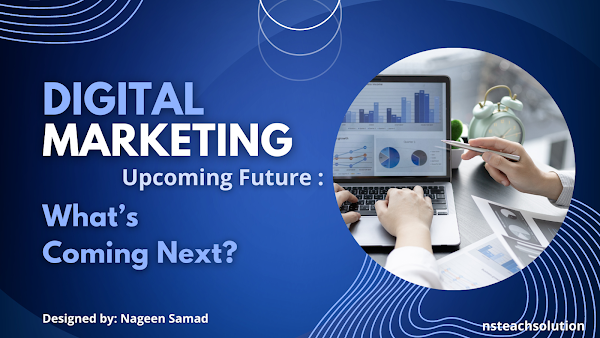Digital marketing has transformed the way businesses connect with their audience and promote their products and services. With the world becoming more and more digital, it's no surprise that the future of digital marketing looks bright. In this article, we'll explore some of the upcoming trends in digital marketing that businesses should be aware of.
Artificial Intelligence
Artificial intelligence (AI) is a rapidly evolving field, and it's making waves in digital marketing. AI-powered tools can help businesses analyze consumer behavior and preferences, predict buying patterns, and create personalized content that resonates with their target audience. Chatbots are one example of AI in action, providing 24/7 customer support and assistance.
Voice Search
As voice assistants like Amazon Alexa and Google Home become more popular, voice search is becoming an increasingly important aspect of digital marketing. Voice search queries tend to be more conversational and longer than typed queries, so businesses need to optimize their content for natural language queries. This includes using long-tail keywords and providing clear, concise answers to commonly asked questions.
Video Marketing
Video marketing has been on the rise for Upcoming years & it's not showing any signs of slowing down. Video content is more engaging and memorable than text or images alone, and it's also more likely to be shared on social media. Businesses can use video marketing to showcase their products and services, tell their brand story, and connect with their audience on an emotional level.
Influencer Marketing
Influencer marketing has become most popular way for businesses to reach or increase new audiences & promote their products. Influencers are people with large followings on social media who can endorse products to their followers. This type of marketing can be especially effective for businesses targeting younger demographics, who tend to be more skeptical of traditional advertising.
Personalization
Consumers expect personalized experiences from the brands they interact with. Businesses can use data analytics and AI to create personalized content, offers, and recommendations for each customer. This can help increase customer loyalty and drive sales, as customers are more likely to buy from brands that understand and cater to their unique preferences and needs.
Augmented Reality
Augmented reality (AR) is a technology that overlays digital information onto the physical world. Businesses can use AR to create immersive experiences for their customers, allowing them to visualize products in their environment before making a purchase. AR can also be used for gamification, creating interactive experiences that engage customers and encourage them to share their experiences on social media.
Social Commerce
Social media platforms are increasingly becoming an essential channel for e-commerce. Social commerce allows businesses to sell products directly to customers through social media platforms like Facebook and Instagram. This can be a great way for businesses to reach new audiences and capitalize on the growing trend of online shopping.
Micro-Moments
Micro-moments are the small moments throughout the day when consumers turn to their phones for information or to make a purchase. These moments are opportunities for businesses to connect with their audience and provide value. By creating content that's relevant and useful in these micro-moments, businesses can build trust and establish themselves as a go-to source of information in their industry.
Digital Marketing’s trends:
Here are some of the current digital marketing trends that are expected to continue in the upcoming years:
1. Personalization:With an increase in data collection and analysis, businesses can provide more personalized experiences for their customers. This includes personalized content, product recommendations, and even personalized pricing.
2. Influencer Marketing:Influencer marketing has become a popular way for businesses to reach their target audience. Influencers have built a loyal following, and businesses are partnering with them to promote their products or services to their followers.
3. Voice Search:With the rise of smart speakers and voice assistants, voice search is becoming more prevalent. Businesses need to optimize their content for voice search and provide clear and concise answers to commonly asked questions.
4. Social Commerce:Social media platforms are becoming more popular for online shopping. Businesses can sell their products directly on social media platforms, making it easier for customers to make purchases without leaving the platform.
5. Video Marketing:Video marketing is becoming increasingly important, with more businesses creating video content to engage with their audience. Short-form video content, such as TikTok and Instagram Reels, is becoming more popular.
6. Augmented Reality:Augmented reality is being used by businesses to create immersive experiences for their customers. AR can be used for product demos, virtual try-on, and even to create virtual showrooms.
7. Micro-moments:Micro-moments refer to the small moments when customers use their mobile devices to make quick decisions or to find information. Businesses need to be present in these micro-moments and provide valuable information to their customers in real time.
Overall, businesses that adapt to these trends and provide personalized, engaging experiences for their customers will be more successful in the ever-evolving world of digital marketing.
FAQ'S:
Q: What is the future of digital marketing?A: The future of digital marketing is bright, with emerging technologies such as AI, voice search, augmented reality, and social commerce becoming increasingly important. Personalization and customer-centric experiences will also be a significant focus for businesses in the future.
Q: How can businesses prepare for the future of digital marketing?A: Businesses can prepare for the future of digital marketing by staying up to date on emerging trends, investing in new technologies, and prioritizing personalized experiences and customer trust. They can also ensure that they have a strong online presence across various platforms to reach their target audience.
Q: What role will artificial intelligence play in digital marketing?A: Artificial intelligence will play an increasingly significant role in digital marketing, from analyzing consumer behavior to creating personalized content and providing 24/7 customer support through chatbots.
Q: How will voice search impact digital marketing?A: Voice search will impact digital marketing by changing the way businesses optimize their content and keywords for natural language queries. It will also require businesses to provide clear and concise answers to commonly asked questions.
Q: What is social commerce, and why is it important for businesses?A: Social commerce is the ability for businesses to sell products directly to customers through social media platforms like Facebook and Instagram. It's important for businesses because it provides an additional sales channel and allows them to reach new audiences through social media.
Q: What is the significance of privacy in digital marketing?A: Privacy is significant in digital marketing because customers are increasingly concerned about how their data is collected and used. Businesses that prioritize privacy and transparency will be more likely to earn the trust of their customers and avoid legal issues.
Conclusion:
In conclusion, the future of digital marketing is full of exciting possibilities. In the advancement of technology, businesses expect to more AI-powered tools, personalized experiences & immersive technologies like augmented reality. Companies must keep up with emerging trends such as voice search, influencer marketing, and micro-moments to remain competitive and relevant. However, it's also important to remember that trust and privacy will continue to be critical aspects of successful digital marketing. By prioritizing transparency and providing value to their customers, businesses can build lasting relationships with their audience and thrive in the ever-changing digital landscape.






Thank you for taking the time to read our article and leaving a comment! We're glad you enjoyed it and we appreciate your feedback. If you have any questions or suggestions for future articles, feel free to let us know. Thanks again!